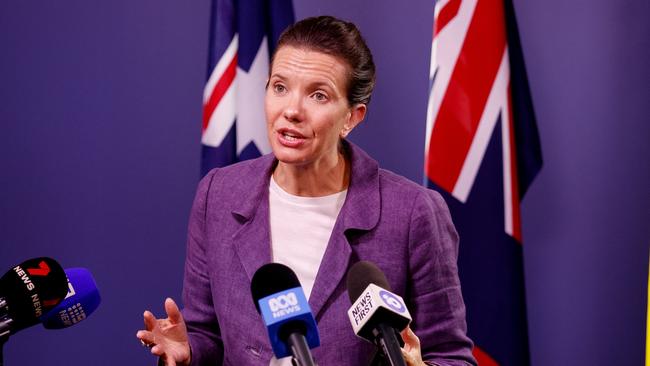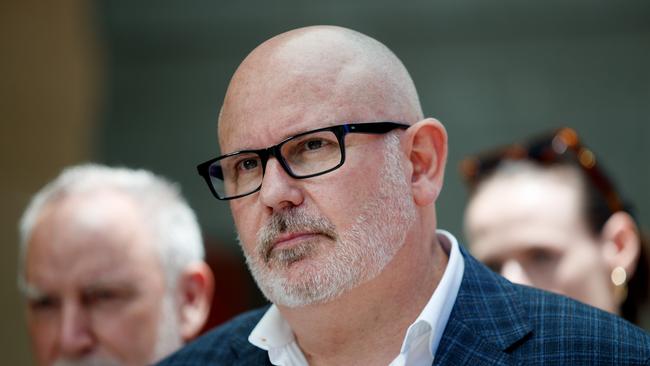NSW Mental Health Minister Rose Jackson warns more psychiatrists could quit troubled health system
More specialist doctors have walked out from one state’s troubled public health sector in an industrial relations war. And more look set to quit.

Breaking News
Don't miss out on the headlines from Breaking News. Followed categories will be added to My News.
A total of 43 psychiatrists have followed through on threats to walk away from NSW’s buckling public mental health system and the government has acknowledged more will likely quit over the coming days.
Up to 200 government psychiatrists had said they would quit the system in a wages dispute.
Mental Health Minister Rose Jackson delivered the update on Thursday as she moved to reassure the public the crisis would not prevent the state’s stretched mental health system from delivering effective care to patients.
“I want to let people know that as of today there are 43 psychiatrists who have engaged in the mass resignation tactic and we do anticipate that number to rise over coming days,” she said.
“But the good news is that we’ve engaged 23 locums to fill those roles and that there are another eight in the system being processed right now.
“As a consequence of that we’re not seeing the significant disruption of mental health services at the local level and the message to the community remains care is available, quality care will always be available through NSW Health.”

The government is shelling out up to $3000 a day to locums, or temporary doctors, to fill gaps left by the resignations.
Public sector psychiatrists are locked in a long-running pay dispute with the federal government and warned for months they would walk off the job without a 25 per cent one-year increase in pay.
The government claims the 25 per cent demand is unreasonable and the dispute has now moved to the Industrial Relations Commission
Ms Jackson said the government would abide by any decision from the commission.
“If the IRC comes to the determination the 25 per cent wage increase is fair and reasonable we will pay it,” she said.
“I’m assuming that the IRC’s outcome will be fair and reasonable. I’ve got faith in that process.”
Ms Jackson said of the about 200 psychiatrists who had tendered their resignations, some 25 had decided to stay while 99 had pushed back when they would leave.
Disruptions are rolling across the sector, but Ms Jackson said the system was “resilient”.
“We have other health professionals stepping up putting their hand up to play a role,” she said.
“There is an opportunity to look at how we can deliver better holistic mental health care wrapping services around people, those psychosocial supports, whether it’s through social workers, whether it’s through peer workers whether it’s through clinical psychologists, whether it’s through general practitioners and that is something that the government is exploring.”
She also said the government had developed “contingency plans” to manage the state’s most high-risk patients and keep the court mental health assessments running in the event of further resignations.
“At the moment, as I said, we haven’t seen any impact on court psychiatry at present and there are no forensic psychiatrists who at present are not showing up to work as part of the mass resignation event,” she said.
“So part of our contingency planning does go to how we will manage that.
“We do anticipate potentially negative impacts across the system.

“You know we’re trying to be really upfront about the fact that when you have, potentially, up to 100 or more psychiatrists resigning en masse as part of an industrial action there are consequences of that.
“But I do really want to reassure the community that as part of our contingency planning we recognise that managing the most risky individuals and the most risky circumstances is the most important thing.”
Australian Salaried Medical Officers Federation executive director Andrew Holland warned the “specialised expertise” of psychiatrists could not be replicated by other health professionals.
“It’s simply not appropriate to ask doctors, nurses, or allied health professionals to take on the duties of psychiatrists,” he said on Thursday.
“While they are highly trained in their respective fields, the specialised expertise of psychiatrists cannot be replicated.
“This approach risks undermining the quality of care and puts patients at significant risk.”
He also said the government’s contingency plans would only increase the burden on an already “overstretched workforce”.
“Nurses and allied health professionals are essential to the system, but forcing them to work beyond their training and expertise will lead to burnout, mistakes, and ultimately, worse outcomes for patients,” he said.
More Coverage
Originally published as NSW Mental Health Minister Rose Jackson warns more psychiatrists could quit troubled health system




